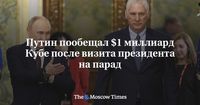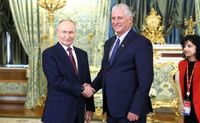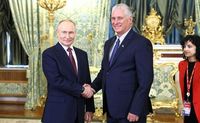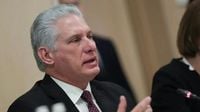In a bold display of solidarity, Cuban President Miguel Diaz-Canel Bermudez has made headlines following his arrival in Moscow for the 80th anniversary of the Victory Day Parade. In response to threats from Ukrainian President Volodymyr Zelensky regarding the safety of foreign leaders attending the event, Diaz-Canel asserted, "We came to Moscow because we believe this is the right thing to do. We are not afraid. We believe in what we are doing." His remarks, reported by RT, underline a significant diplomatic stance amid increasing tensions between Russia and Ukraine.
Diaz-Canel's arrival on May 4, 2025, was marked by a sense of honor as he prepared to participate in the celebrations on Red Square, commemorating a pivotal moment in history—the victory over Nazi Germany. The Cuban leader's presence is not merely symbolic; it reflects Cuba's ongoing commitment to maintaining diplomatic relations with Russia despite international pressures.
On May 7, Serbian President Aleksandar Vucic also arrived in Moscow, defying warnings from the European Union and Kyiv. Vucic confirmed his participation in the festivities, signaling that some world leaders remain steadfast in their diplomatic efforts with Russia, a viewpoint that contrasts sharply with Zelensky's recent statements. Zelensky has publicly rejected a proposal from Russia for a three-day truce during the Victory Day celebrations, citing security concerns for foreign leaders attending the parade.
Diaz-Canel's visit comes with significant economic implications for Cuba. Following his discussions with Russian President Vladimir Putin, it was announced that Russia would invest $1 billion in the Cuban economy by 2030. This investment, as outlined by Russian Deputy Prime Minister Dmitry Chernyshenko, will be directed towards various joint projects, including the construction of hotels, revitalization of the sugar industry, and the supply of Moskvich cars for taxi services.
Chernyshenko emphasized the importance of these investments, stating that they would be executed by Russian companies and businessmen as part of a broader partnership plan approved by Moscow and Havana last November. The plan encompasses twelve projects across six sectors, highlighting Cuba's role as a reliable partner for Russia.
The projects slated for development include the organization of taxi services using Moskvich vehicles, hotel construction on Cuban resorts, and initiatives aimed at restoring the Cuban sugar industry, alongside advancements in energy, information technology, and heavy industry. To facilitate these investments, Russian authorities plan to subsidize interest rates for businesses willing to invest in Cuba.
This latest commitment from Russia marks a significant shift in the economic relationship between the two nations, especially following the last major investment in Cuba back in 2015, when Russia extended a loan of 1.2 billion euros for the construction of two power plants. However, Cuba struggled to meet its repayment obligations, leading to negotiations that allowed the country to defer payments until 2028, with the final settlement pushed to 2040.
Historically, Russia has shown a willingness to support Cuba financially, with President Putin previously forgiving $32 billion in debt in 2014. This gesture underscores the depth of the relationship between the two countries, which has persisted despite the shifting dynamics of global politics.
As the world watches the unfolding events surrounding the Victory Day Parade, the contrasting approaches of different nations highlight the complex geopolitical landscape. While some leaders, like Zelensky, emphasize caution and security, others, including Diaz-Canel and Vucic, opt to reinforce their alliances with Russia, suggesting a divergence in international perspectives on the ongoing conflict.
Diaz-Canel's comments and the planned investments signal a continued commitment to strengthening ties between Cuba and Russia, even as international tensions rise. This development is likely to resonate within the broader context of global diplomacy, where the lines between allyship and opposition are increasingly blurred.
In summary, the participation of leaders like Diaz-Canel and Vucic in Moscow's Victory Day celebrations serves as a reminder of the enduring relationships formed despite geopolitical challenges. As Cuba prepares to welcome significant investments from Russia, the implications of this partnership will unfold in the coming years, potentially reshaping the economic landscape of the island nation.




